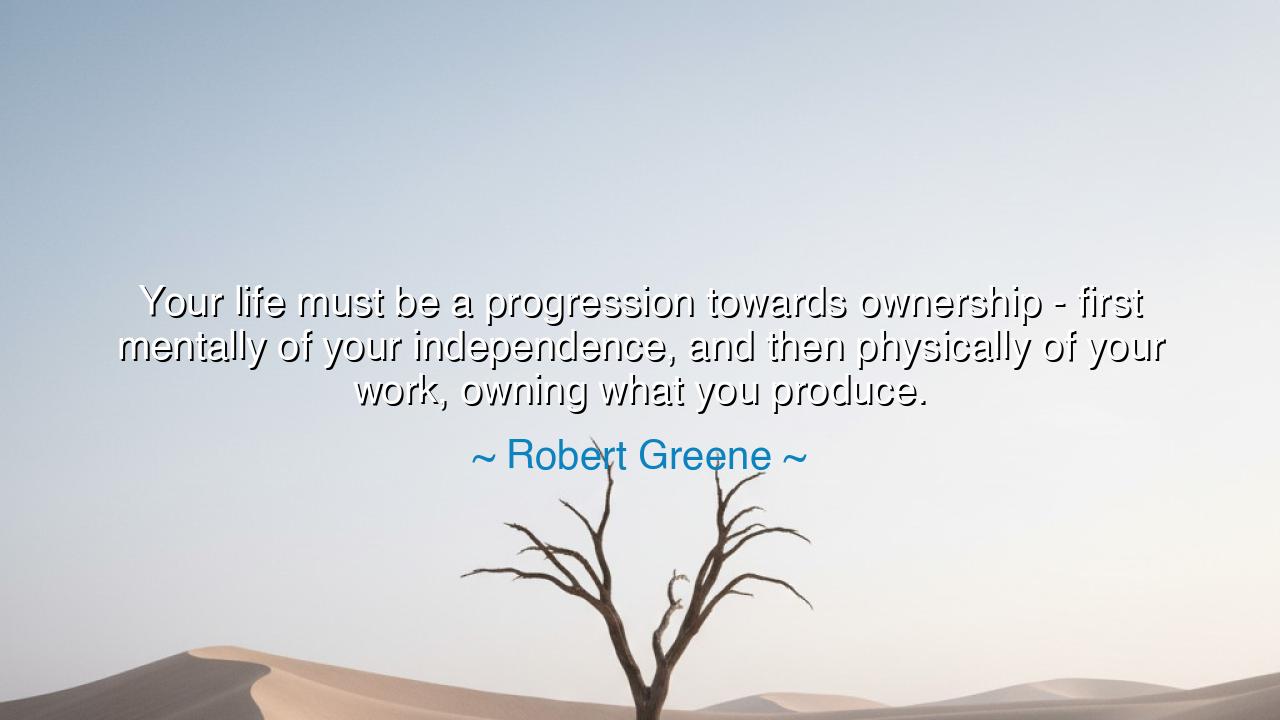
Your life must be a progression towards ownership - first
Your life must be a progression towards ownership - first mentally of your independence, and then physically of your work, owning what you produce.






The words of Robert Greene—“Your life must be a progression towards ownership—first mentally of your independence, and then physically of your work, owning what you produce”—speak like a clarion call to the soul that seeks mastery. They are not the idle musings of comfort, but the fierce commandments of freedom. For in this saying lies the path of all who rise above servitude, who refuse to live as mere instruments of another’s design. It is the eternal journey from dependence to ownership, from imitation to creation, from shadow to light.
To own your independence mentally is the first and hardest conquest. Before a man may hold dominion over his craft, he must first wrest dominion over his own mind. The weak spirit allows others to think for him; he follows the tide of opinions, fearing the loneliness of self-reliance. But the strong soul withdraws into the sanctuary of thought, questions all, and builds his inner citadel of conviction. Such a one learns that true freedom begins not with wealth or land, but with mental independence—the refusal to let another define what is valuable, what is possible, or what is worthy. For as long as a man’s thoughts are owned by another, his life is not yet his own.
Only when the mind stands firm and unbowed can the second stage of progression begin: to own what you produce. This is not mere possession of material goods, but the spiritual claim over one’s labor—the pride of creation, the authority of craftsmanship. To create and to stand by one’s creation without apology—this is the mark of the master. Too often men toil for others’ dreams, giving the strength of their hands and the brilliance of their minds to build empires not their own. Greene’s teaching warns us: labor without ownership is the slow death of the spirit. The hands that build must also possess what they build, lest the soul wither in servitude.
Consider the tale of Leonardo da Vinci, whose genius was at first bound by the chains of patrons. He painted for dukes and popes, crafting wonders that others claimed as theirs. Yet within him burned a greater hunger—not for gold, but for freedom. He broke from his masters, wandered from city to city, and followed the voice of his own vision. His later works—like The Last Supper and his notebooks of invention—were no longer the property of courts, but the expressions of a liberated mind. In reclaiming his independence, Leonardo achieved the highest form of ownership: mastery of himself and his art.
The ancients taught that all mastery is self-mastery. A man who has not conquered his own mind cannot hope to command his world. Thus, mental independence must come before physical possession. One may inherit wealth or land, but unless his mind is his own, he remains a vassal in spirit. The great Stoic philosophers, from Epictetus to Marcus Aurelius, understood this truth: that the free man is he who commands himself. Epictetus was born a slave, yet through his mind he became greater than emperors. His body belonged to another, but his thoughts did not. And thus, he was free in a way no chains could bind.
Greene’s wisdom demands that we each become the author of our destiny. To own your work means to pour your soul into what you create and to stand by it with courage. Do not let others define the worth of your labor. The world is filled with those who will pay you to forget your own dreams, to build their towers instead of your temple. Resist this temptation. Work for others if you must, but never let go of the inner vision that belongs only to you. Each act of creation, each step toward mastery, should lead you closer to that sacred state of self-ownership, where no master’s hand can dictate your fate.
The lesson, then, is both simple and eternal: let your life be a progression toward ownership. Begin by mastering your thoughts—build a fortress of independence within. Then, move outward to your craft: create, refine, and claim what you make as your own. Do not rush the journey, for mastery is the slow unfolding of the soul’s power. But let no day pass in which you work only for the dreams of others. Plant the seeds of your own vision, and nurture them until they bear fruit that belongs to you.
And so, to those who walk the path of greatness, take heed: the goal of life is not comfort, nor obedience, but ownership. Own your mind, your labor, your destiny. Refuse to be a tenant in another man’s kingdom when you were born to rule your own. For when your life’s work stands complete—when your thoughts, your creations, and your will are wholly yours—then you shall have achieved what Robert Greene calls the highest victory: the unity of the independent mind and the self-owned life.






AAdministratorAdministrator
Welcome, honored guests. Please leave a comment, we will respond soon